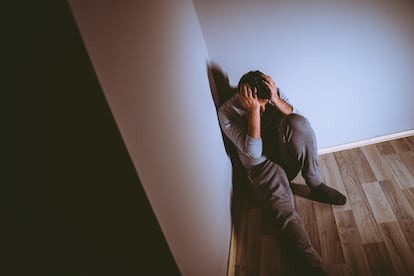What to do if depression isn’t responding to treatment?
It’s key to make sure past diagnoses were correct, evaluate past attempts and get to know different evidence-based treatments. An integrated approach is fundamental, rather than one based exclusively on pharmaceuticals

In the memoirs of composer Hector Berlioz, he describes “the dreadful sense of being alone in an empty universe.” While in this state, the musician ceased composing, became inactive and immobile, with no other option but “to suffer.” Andrew Solomon says that acute depression is both destruction (the instinctive functions of life disappear) and birth (that of a demon). Nearly all these testimonies speak of being “at the edge of the abyss,” which can mean the verge of madness or destruction. For those who have not had this experience, it is difficult to imagine. What is far worse is when the demonic situation persists and continues despite treatment. What to do then?
The first step is to make sure that what is happening is really a treatment-resistant depression. Its diagnosis must be exact; we must never offer treatment blindly. It is necessary to rule out other conditions, for example, anemia, hypothyroidism and other hormonal disorders that may account for symptoms. Due to this, all patients under treatment for depression and anxiety should first undergo, at the least, a blood test and medical evaluation to rule out these factors. We should also ask: is the patient taking any drug for another pathology that could cause depression? Is the patient consuming any toxic substance that can lead to or perpetuate such symptoms?
Within mental pathology, it is necessary to differentiate depression from anxiety, a personality disorder or bipolar disorder, for which antidepressants will not only be ineffective, but can worsen the situation. We also have to make sure that past therapeutic attempts lasted for an adequate duration (for antidepressants, six weeks) and had good adherence (between 30% and 50% of patients do not take their treatment correctly). We will also get clues from asking the patient how they responded to past treatments.
In its most accepted definition (lack of response to two therapeutic attempts of adequate duration and dosis), treatment-resistant depression (TRD) affects 30% of patients. This figure comes from clinical trials that exclude difficult patients, and in which all confounding variables are controlled. In real life, the percentage encompasses at least half of all patients. Certain factors seem to be associated with this resistance: older age, greater severity of symptoms, coexistence with other mental disorders, cognitive dysfunction (such as lack of concentration or memory problems) chronic pain and a history of trauma. According to the algorithms, the next steps entail deploying pharmacological tactics with demonstrated efficacy: combining two antidepressants, substituting one with another from a different family or making the antidepressant more potent through the use of another substance.
Nonetheless, this is far from a subject limited to pharmaceuticals. There are a variety of reasons to incorporate psychotherapy in an integrative approach to depression. Number one, because patients tend to prefer it as a therapeutic strategy; second, because it provides opportunities for emotional learning and relationship management, and fosters resilience and the search for meaning. Third, because meta-analyses show that adding psychotherapy to pharmacological treatment has a moderate effect (which is a big deal).
We can try a carousel of antidepressants, but it won’t work. In the same way, we can fruitlessly apply multiple psychotherapy techniques to a patient with severe melancholic depression, who is in need of a pharmacological approach
Therapies that have been subject to the most study are cognitive-behavioral, interpersonal and mindfulness, although it seems that efficacy does not rely so much on the specific technique, as on factors common to all schools. International guidelines recommend combined pharmacological and psychotherapeutic treatment. When did psychiatry become uncoupled from psychotherapy? The fathers of psychotherapy, Sigmund Freud, Carl Jung, Aaron Beck, Otto Kernberg, Alfred Adler, Eric Berne and Joseph Wolpe, were psychiatrists. Nowadays, we have the opportunity to work side by side with clinical psychologists to jointly implement this essential therapeutic tool.
But the concept of treatment-resistance is sometimes overly focused on the treatment and not enough on the patient’s context. There are depressions that are very much conditioned by the devastating experience of childhood trauma, by oppressive familial coexistence that perpetuates suffering, or by unbearable jobs. We can try a carousel of antidepressants, but it won’t work. In the same way, we can fruitlessly apply multiple psychotherapy techniques to a patient with severe melancholic depression, who is in need of a pharmacological approach. Broadening our focus is essential.
Finally, there are third or fourth options that may offer hope for patients and their families. Electroconvulsive therapy, despite its terrible reputation, has demonstrated robust efficacy in resistant depression. It is carried out under anesthesia and under precise, controlled conditions, leaving behind the old-fashioned scenes from One Flew Over the Cuckoo’s Nest. Transcranial magnetic stimulation is more readily accepted by patients; it has promising evidence for its use, but is not widely available in all countries. Recently, drugs like ketamine and esketamine have gained in popularity, with novel treatment plans and fast and, apparently, sustained efficacy. They are expensive drugs, which should be applied judiciously and responsibly to patients who have clear indications. Psilocybin, another psychedelic, has just hit the commercial market in Australia, to high expectations.
In this sense, new tools in the pharmaceutical industry are great news. Perhaps some newcomers are still wondering: do pharmaceutical laboratories count as nonprofits? They definitely do not. Just like Ikea and Zara, they are companies whose goal is to make money. But if they are well regulated and ethically supervised, they are indispensable agents in our healthcare system. In my opinion, it is just as wrong to buy their commercial messaging wholesale as it is to demonize the entire industry as part of a conspiratorial, anti-capitalist narrative. The pragmatic and responsible move would be to align the drug industry’s legitimate interests with those of society, which is in urgent need of scientific advances when it comes to vaccines and other pharmeceuticals.
To the patient, who is our top priority, we must communicate that we are not giving up, that there are many options and we will do all that is in our power. From many approaches, hand in hand with a range of professionals, all with a single objective: to find, as in Albert Camus’ famous quote, in the midst of winter, an invincible summer, and to not lose hope.
Sign up for our weekly newsletter to get more English-language news coverage from EL PAÍS USA Edition
Tu suscripción se está usando en otro dispositivo
¿Quieres añadir otro usuario a tu suscripción?
Si continúas leyendo en este dispositivo, no se podrá leer en el otro.
FlechaTu suscripción se está usando en otro dispositivo y solo puedes acceder a EL PAÍS desde un dispositivo a la vez.
Si quieres compartir tu cuenta, cambia tu suscripción a la modalidad Premium, así podrás añadir otro usuario. Cada uno accederá con su propia cuenta de email, lo que os permitirá personalizar vuestra experiencia en EL PAÍS.
¿Tienes una suscripción de empresa? Accede aquí para contratar más cuentas.
En el caso de no saber quién está usando tu cuenta, te recomendamos cambiar tu contraseña aquí.
Si decides continuar compartiendo tu cuenta, este mensaje se mostrará en tu dispositivo y en el de la otra persona que está usando tu cuenta de forma indefinida, afectando a tu experiencia de lectura. Puedes consultar aquí los términos y condiciones de la suscripción digital.









































